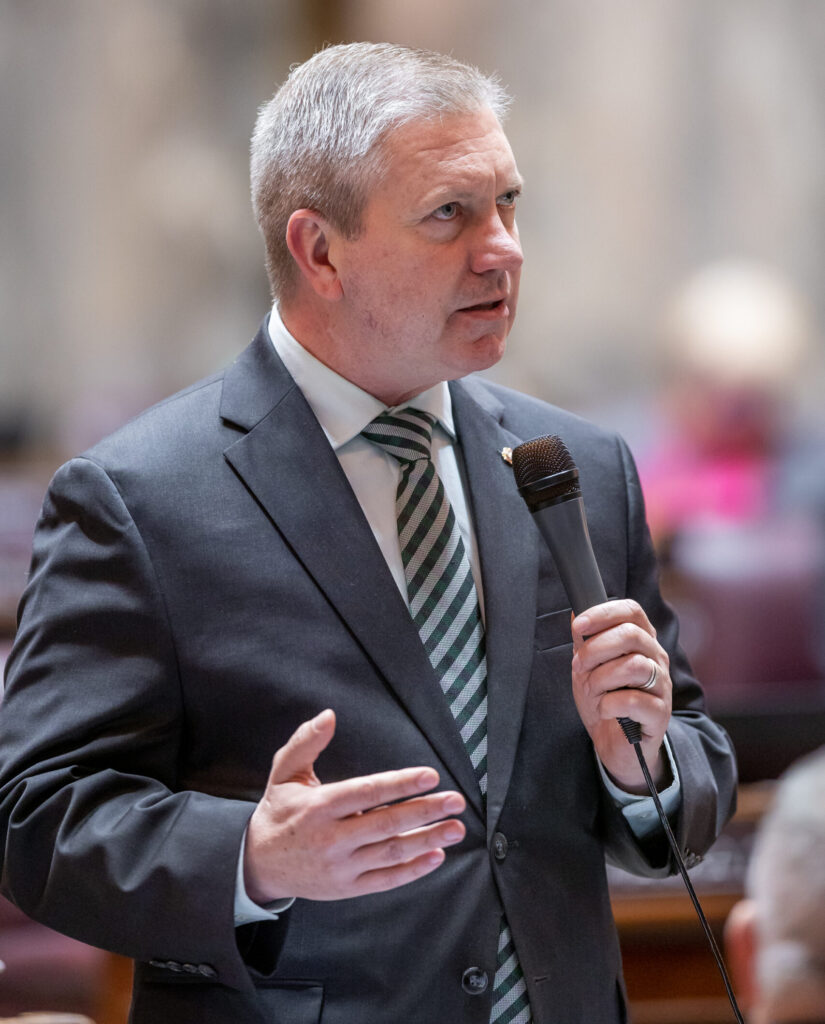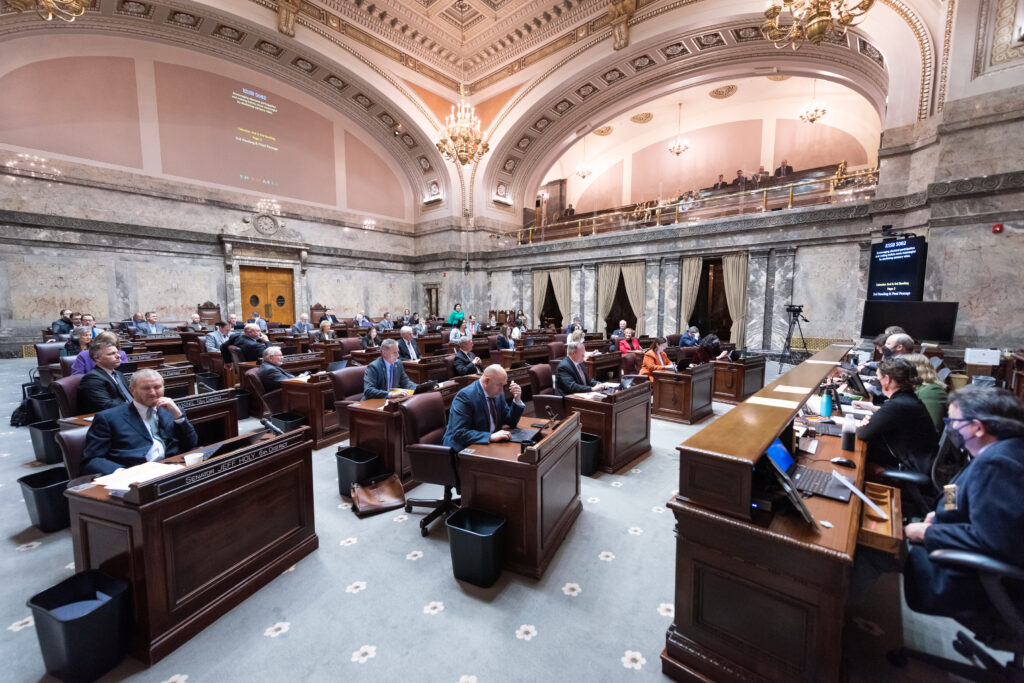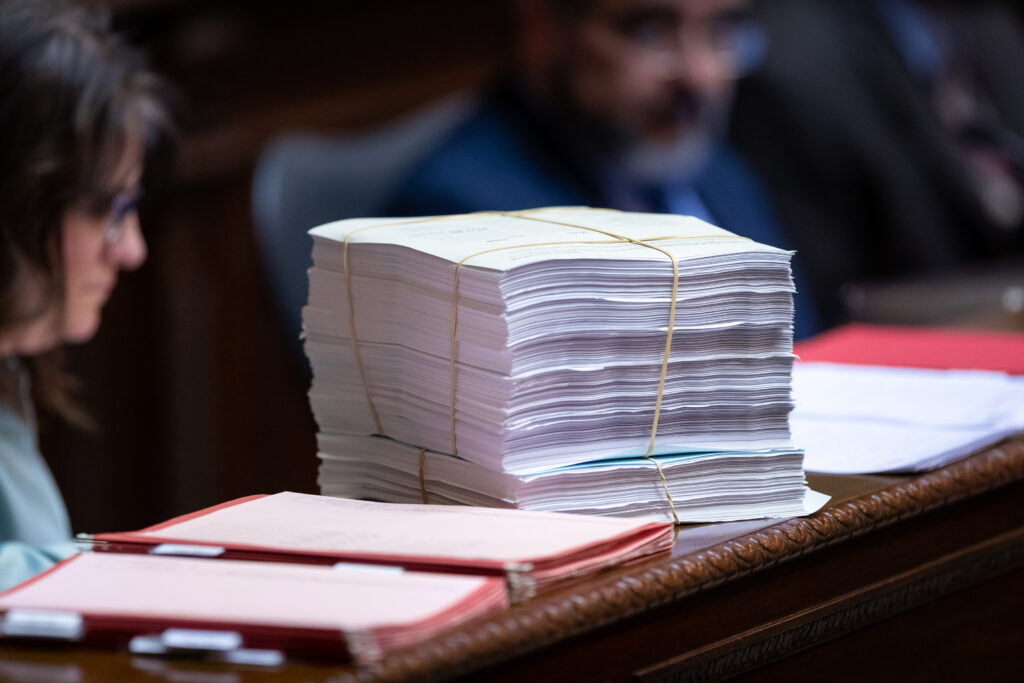Drugs, cops and taxes are the top issues in the final week of the 2023 legislative session
Note: The following e-newsletter was sent to Sen. Chris Gildon’s subscribers April 18, 2023. To subscribe to Sen. Gildon’s e-newsletters, click here.
On the Senate floor.
Dear friends and neighbors,
We are in the final week of our 2023 legislative session and things are happening fast. While the Legislature has acted on a wide array of items, some of the largest tasks still remain. Today, I’d like to offer a quick snapshot of those items.
Police pursuit: Two years ago, the Legislature enacted sweeping reforms to the statute governing police pursuit laws, and I’ve spoken on this often. Problems quickly emerged, and this year we were forced to consider a legislative fix. Yesterday, the Senate voted 26-23 to accept amendments made by the House of Representatives and send the final bill to the governor. The vote was very mixed, with Republicans and Democrats voting for and against the bill. Ten Republicans and 16 Democrats voted PRO while 9 Republicans and 13 Democrats voted CON. I voted for the bill as it is a small improvement on our current law.
Assuming the governor signs it, Senate Bill 5352 will allow police to pursue suspects for driving under the influence and certain other violent crimes. Police still must stand down in all other cases – involving reckless driving, stolen vehicles, robbery, theft and many others.
No one expects this bill will solve the problem, and we will likely engage in another round of debate next year.
Drugs and the ‘Blake fix’: Two years ago, in a case known as State v. Blake, our state Supreme Court overturned Washington’s laws against possession of hard drugs like heroin and fentanyl. The court said it found a technical problem with our felony statutes. This might have been fixed easily, by adding a single word to the law. Instead, our urban colleagues used this as an excuse to rewrite our drug laws and downgrade possession from a felony to a barely enforceable misdemeanor.
As with the pursuit issue, we quickly saw terrible results. Department of Health figures show overdoses are the leading cause of death for those under age 50 and will be the leading cause of death for those under 60 once the final data is received. There were 700 deaths last year in King County due to fentanyl alone. Law enforcement agencies lost their most important tool to get people out of homeless camps and into the treatment they need. Rampant drug usage also is a factor in the increasing rate of property crime throughout the state.
The issue returned to the table this year because the current law expires June 30. Unfortunately, just as with the pursuit bill, we also saw resistance to tougher drug laws. We passed a compromise bill in the Senate, SB 5536, that would make possession a gross misdemeanor and offer a number of options for drug rehabilitation in lieu of criminal penalty. Unfortunately, amendments in the House substantially weakened this bill, reducing incentives for treatment, eliminating accountability for those who refuse it, and preempting any city and county ordinance that attempts to go further.
Now the Senate faces a dilemma. Law enforcement organizations like the Washington Association of Sheriffs and Police Chiefs are urging us to just say no. If we refuse to concur, and the House folds its arms, our drug laws go away and hard drugs are legalized at the state level. If we accept the House amendments, we will be left with drug laws that are wholly ineffective.
Police groups say cities and counties might be able to enact anti-drug ordinances that are better than this bill. When police groups say the bill is so bad they would prefer nothing at all — that should tell us something.
Budget bill awaits action on the “bar” of the Senate, March 29.
Taxes, taxes, taxes: Just a few weeks ago, those of us working on the operating budget celebrated the fact that both parties sat down in the Senate, worked together, and came up with a proposal that required no new taxes. I guess we should have knocked on wood.
We may not need a tax increase, but our majority colleagues certainly seem serious about passing one anyway. Five major proposals have gotten serious attention this session, and any might be brought up before adjournment. These include raising the estate tax and a brand-new “wealth tax.” In the final week, the most serious contenders are:
- Income tax expansion. This certainly didn’t take long. On March 24, the state Supreme Court approved a new income tax on capital gains, with a ruling that ignored legal precedents, the common understanding of tax law, and dictionary definitions of English-language words. A week later, our colleagues introduced SB 5767 to tax the income of high-paid hospital executives. If this were to pass, we can be sure of another court challenge and another ruling from the Supreme Court. The ruling that would be required in this case would also give the Legislature the authority to impose an income tax on all of us without a public vote. Does anyone see a problem here?
- Property tax increases. SB 5770 would triple the growth in property taxes and cost taxpayers $4.1 billion by 2029, according to official estimates. Right now, the state limits growth in property taxes to 1 percent. This bill would raise it to 3 percent increases per year.
- Real estate excise tax increases. House Bill 1628 would increase state taxes on the sale of high-end properties. More importantly, it would give local governments the authority to dramatically increase taxes on all real estate transactions. The goal of the bill is to raise money to build affordable housing — by making other housing less affordable.
Thanks for reading — it is an honor serving you!
Sincerely,
Sen. Chris Gildon, 25th Legislative District
Deputy Leader, Senate Republican Caucus
Contact me!
PHONE: (360) 786-7648
E-MAIL: Chris.Gildon@leg.wa.gov
MAILING ADDRESS: P.O. Box 40425/ Olympia, WA 98504
LEAVE A MESSAGE ON THE LEGISLATIVE HOTLINE: 1-800-562-6000
NOTE: Written communications are subject to disclosure under the Washington Public Records Act.
















